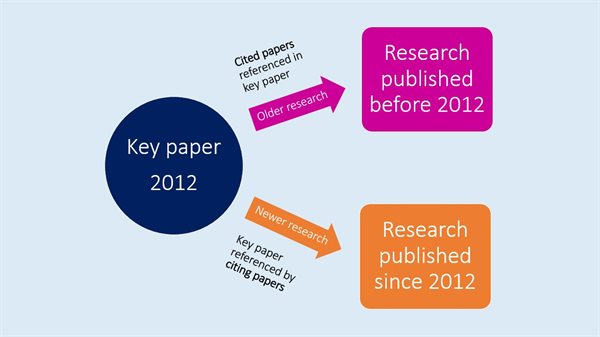
Citation searching
Find cited and citing papers from key publications to follow research on a topic backwards and forwards in time.
Go to: What is citation searching? | Benefits | Databases for citation searching
What is citation searching?
Citation searching is a way of finding additional relevant research on a topic from a specific paper, by looking at the references that paper has used (cited papers), then looking to see if the same paper has since been referenced by others (citing papers).
If you’re at the beginning of a literature search, and have found only one or two relevant papers, following the cited and citing references from those papers can be a quick and easy way of finding more.

Diagram demonstrating how research can be following backwards and forwards in time from a key paper
Following cited references from a key paper (older research)
Cited references are detailed in the reference list/bibliography at the end of a key paper.
They are the publications referred to by the author to support their arguments, or to contradict the arguments of others.
Cited references are older than the paper in which they have been referenced, and therefore lead to previous research on a topic, which could include the original (seminal) research.
Use cited references from a key paper to follow research on a topic backwards in time.
Finding references citing a key paper (newer research)
Citing references are publications that have referenced a key paper, and are often linked to from a paper’s entry on a database.
They are more recent than the paper they are referencing, and therefore lead to more up to date research on a topic, which could include newer developments, evidence, or recommendations.
Citing papers may also contain examples of critical engagement with previous research, supporting your own critical analysis.
Use references citing a key paper to follow research on a topic forwards in time.
Back to the top
Benefits of citation searching
Citation searching allows you to:
- Find additional relevant research on a topic, which you may not have found through your subject database searches.
- Identify other keywords you could use in your search to find additional information.
- See how the research on a topic has developed over time, from the earliest to the latest evidence.
- Identify authors who regularly publish research on a topic.
Determining the impact of a paper by the number of times it has been cited
By looking at the number of times a paper has been cited, it may also be possible to determine the impact it has had within its field. For example:
- A highly cited paper suggests it could be important, or ground-breaking research.
- A paper with a low number of citations may indicate less useful research.
However, the number of citations doesn’t always signify good quality research. For example:
- Highly cited papers may be controversial, and therefore no guarantee of good quality research (such as the MMR paper).
- Some papers may appear to have a high number of citations, but the authors may have self-cited their own work.
- A paper with fewer citations may be in a specialised area, therefore not attracting a wide audience, but the research could be as valid as a highly cited paper.
Back to the top
Databases for citation searching
Back to the top
Continue your journey
You may also be interested in:
Further support
Disability support services
Language and communication skills